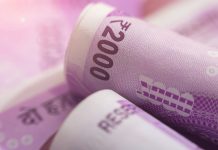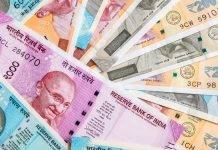The US dollar is lower against the Indian rupee on Tuesday.
The Indian rupee is benefitting from a pause in emerging market outflows with investors pinning their hopes on a new government stimulus plan in the United States. That follows yesterday’s biggest ever Indian stock market decline that triggered a trading halt on the BSE stock exchange.
A series of unprecedented new measures from US central bankers have thawed heated demand for US dollars for now.
USD/INR was higher by 36 pips (-0.48%) to 75.95 with a daily range of 75.95 to 76.33 as of 11am GMT.
The currency pair has topped out at Monday’s peak above 76 for now and is now back just beneath the level, leaving it still +0.77% higher on the week to date.
Indian rupee higher before US coronavirus stimulus
The best chance to limit rupee declines probably comes from improved risk sentiment. Democratic House Speaker Nancy Pelosi is now talking about a $2.5 billion spending plan in the United States, up from the $2 billion suggested by White House economic advisor Larry Kudlow over the weekend.
The record lows in the Indian currency this week come despite reported market interventions from the Reserve Bank of India, which has been selling 5 billion US dollars to limit the rupee declines. The RBI has over $400 billion in foreign currency reserves should it be necessary to deploy them.
US dollar weaker after Fed actions
The Federal Reserve could almost be accused of deliberately trying to weaken the dollar, almost. That has indeed been the effect so far in a series of big new measures that began last week.
Three important new updates were made yesterday to the way the Federal Reserve plans to backstop US businesses and financial markets. The first is open ended quantitative easing (QE), that means there is not dollar limit on how many bonds the Fed can buy. The second is that it will lend directly to businesses rather than going through retail banks. Thirdly, the Fed will now buy corporate bonds, something it has backed off from doing until now to help sure up credit markets that have been especially sensitive to the coronavirus scare.





